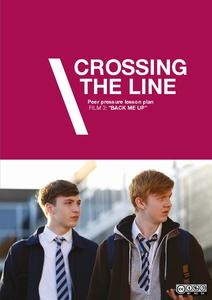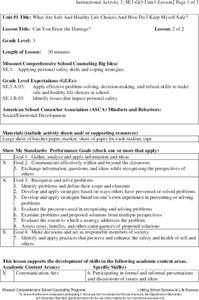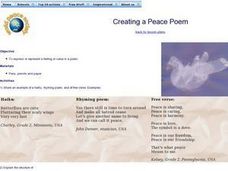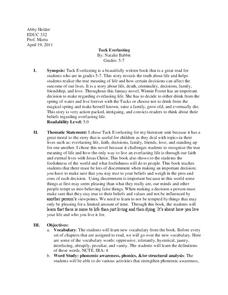Committee for Children
Students Learn to Stop Rumors Before They Start
Two activities look at how rumors are spread and ways class members can stop them. The first activity brings forth an in-depth conversation about how reporters gather information to write articles and how students can implement the same...
Nemours KidsHealth
Empathy: Grades 9-12
Empathy can be the glue that holds a society together. Learning how to see and appreciate a situation from another's point is key to developing empathy toward others. The two activities in this resource are designed to help teens...
Anti-Defamation League
Gossip, Rumors and Identity
A thoughtful discussion prompts middle schoolers to reflect on gossip and rumors, what they are, their experience with them, and how some groups experience it more than others. Scenarios challenge participants to consider the impact of...
Curated OER
The "Be Kind Kids" Project
Students create a visual display that highlights friendship and kindness. They read and discuss a poem, and design and create a large poster or banner that emphasizes kindness, anti-bullying, and friendship.
Curated OER
Words Can Hurt: King Day (4th)
Students study stereotypes and write about how to end stereotyping. For this stereotypes lesson, students study a T-chart about boys and girls stereotypes. Students then discuss stereotypical phrases. Students discuss Martin Luther King,...
Curated OER
Owen and Mzee
Students examine the trait of compassion. In this character education lesson, students read Owen and Mzee: The True Story of a Remarkable Friendship by Isabella Hatkoff. Students discuss the theme of the story as well as what it means to...
Curated OER
Building Background
Learners, in groups, define qualities of friends and leaders. The groups define how far a friend or leader should go to protect their friendship or country. They research Julius Caesar, Marc Anotony and Shakespeare and read Julius Caesar.
Curated OER
Life's Greatest Pleasures
Students explore the meaning of what makes life pleasurable. In this social awareness lesson plan, students read an article that states things that people might enjoy doing for pleasure, then complete numerous activities to reinforce...
Curated OER
Who Needs Friends?
Students discuss how to be a good friend to others. They create a list of characteristics to use in more future lessons. They reflect on they type of friend they are in journal writings.
Busy Bee Preschool
Rainbow Fish Craft
Follow your reading of The Rainbow Fish with this adorable printable. Each pupil gets their own fish to color and their own foil scale to affix to the fish.
Curated OER
Puberty/Adolescence, Day 3: "Am I Normal?"
"Am I normal?" Bring this topical discussion to your health or teen issues class, who might be struggling with their developing identities. Learners discuss relationships, including acquaintences, friendships, girlfriends, boyfriends,...
Penguin Books
A Teacher's Guide to the Signet Classic Edition of William Shakespeare's Julius Caesar
Are the lessons of Shakespeare's Julius Caesar still applicable today? Explore themes, characterization, and plot structure with a thorough teacher's guide to the play. The resource covers the entire text and offers rigorous activities...
Developing a Global Perspective for Educators
Imagine Being Me
The design of this two-day lesson eloquently exposes learners to the topic of social justice for people with disabilities. The plan is built off the reading of Are You Alone on Purpose? by Nancy Werlin. The activity introduces readers to...
Childnet International
Peer Pressure
What do you do if someone you like wants you to do something you don't want to do? A series of activities, including discussion, videos, role-play, and poster projects, demonstrate the most effective ways to withstand peer pressure online.
Missouri Department of Elementary
Ingredients of a Relationship Recipe
An eye-catching hook makes a smart analogy between ingredients for a food recipe and ingredients for quality relationships. Scholars discuss and list qualities they feel contribute to positive interactions. Pupils create a recipe card...
Missouri Department of Elementary
My Problem…Your Problem…Our Problem
Encourage sixth graders to take responsibility for their actions and become a problem solver. Pupils discuss new problems faced in sixth grade then identify ones that involve other people. A worksheet guides their practice in conflict...
Missouri Department of Elementary
Conflict Mediation – Part 1: Getting Ready
Two scholars walk into a room arguing, what is happening? Peers observe the two actors in preparation for a whole-class discussion about conflict. Learners establish a conflict, name the three approaches—passive, aggressive, and...
Missouri Department of Elementary
Don’t Tease Me!
A whole-class discussion sheds light on school bullying and ways to prevent it. Scholars share a moment when they observed or experienced some sort of teasing. Pupils brainstorm ways such behavior can be stopped or prevented.
Missouri Department of Elementary
Can You Erase the Damage?
A pencil and an eraser bring forth the message that negative comments never truly disappear. On a large piece of paper, scholars list negative comments then attempt to replace them with kind ones. Pupils discuss the impact of negative...
Curated OER
Poetry Project
Choosing a poet or a theme, eighth graders conduct research in the world of poetry. They conduct Internet research and select five poems that fit their poet or theme, and create a seven slide PowerPoint presentation on their selected...
Curated OER
Creating a Peace Poem
Second graders write a poem using words from a list and practice poetic forms. In this lesson on writing a peace poem, 2nd graders brainstorm words or phrases associated with "peace." Students choose a poetic form to express their...
Curated OER
Tuck Everlasting
Clearly written as an assignment for a higher-level education class, this formal lesson plan contains some fun and well-researched strategies for teaching the novel Tuck Everlasting by Natalie Babbitt. Among the best ideas included in...
Museum of Disability
Don't Laugh at Me
You can prevent bullying in your classroom by addressing kindness, empathy, and acceptance with your littlest learners early on. After reading Don't Laugh at Me by Steve Seskin and Allen Shamblin, kids discuss the ways that words can...
Museum of Disability
Looking Out for Sarah
Perry the dog is Sarah's best friend and her guide to the visual world. Young readers learn about guide dogs and communication with Looking Out for Sarah by Glenna Lang, through a series of discussion questions and activities.

























